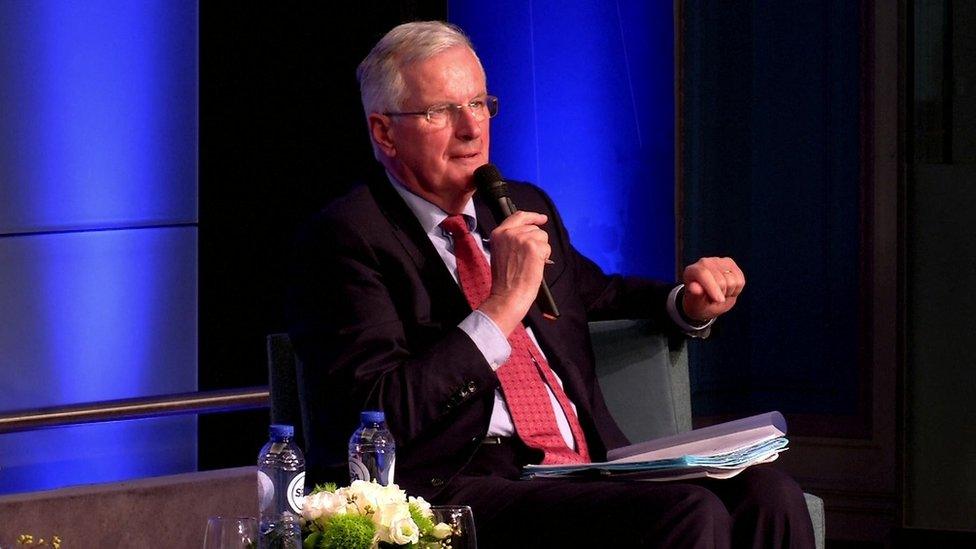Brexit: 'Little progress' in talks since March, says Barnier
- Published
- comments

Michel Barnier is leading the negotiations for the EU side
Brexit talks have made "little" progress since March, the EU's chief negotiator has said.
Michel Barnier said there was a "risk of failure" in two key areas - Northern Ireland, and how the agreement will be governed.
He said June's EU summit was a "key rendezvous" to reach a deal that can be ratified before the UK leaves.
And he defended the EU's stance over the UK's involvement in the new Galileo sat-nav system.
The UK has played a key role in the programme's development so far, but faces being shut out of key elements of the programme after Brexit.
UK ministers are now considering setting up a rival version.
Galileo row
Mr Barnier said there had been "misunderstandings" in the coverage of the story, adding: "We are not kicking the UK out of Galileo. The UK decided unilaterally and autonomously to withdraw from the EU. This implies leaving its programmes as well."
EU rules mean the UK and its companies cannot participate in the "development of security sensitive matters", he said, adding that this did not mean the UK could not use an encrypted signal from the system as a third country.
Earlier Science Minister Sam Gyimah said the EU's position was "extremely disappointing".
"The EU is playing hard ball with us," he told BBC Radio 4's Today programme.
"We have helped to develop the Galileo system. We want to be part of the secure elements of the system and we want UK industry to be able to bid for contracts on a fair basis.
"It is only on those terms that it makes sense for the UK to be involved in the project."
Barnier on negotiations
Mr Barnier was speaking after updating the remaining EU member states on the latest in the Brexit negotiations.
Asked about the progress that had been made since March, he said: "I would say little, not very little."
He said the transition period that is expected to follow Brexit day in March 2019 depended on "operational solutions" being found on the issue of Northern Ireland's border with the Republic.
"The clock is ticking" to reach an agreement before October or November which can be ratified by the UK and European Parliaments and the EU Council, he said.
"So, little progress but we are working on technical issues which is always useful.
"None of these issues are negligible. The two key points which remain, where there is risk of failure, are the governance of the agreement and the Ireland-Northern Ireland issue."
Customs question
The UK government has yet to settle on the model it wants to replace the customs union in order to avoid checks at Northern Ireland's border with the EU.
Prime Minister Theresa May met Conservative MPs at Downing Street to set out the government's two proposals.
Earlier Health Secretary Jeremy Hunt warned Foreign Secretary Boris Johnson - who has described one, a customs partnership, as "crazy" - to keep discussions private.
"On the EU side, if they see divisions in the open, they will exploit that," Mr Hunt said.
At a press conference with his French counterpart, Mr Johnson was asked why he had not resigned given his differences with the prime minister - but he did not repeat his criticism of the partnership option and said he thought Mrs May's position was "completely right".
Mrs May's key Brexit committee of senior ministers - which is divided over the customs issue - meets again on Tuesday.